Posted September 10, 2021 by Nicky in Reviews / 0 Comments
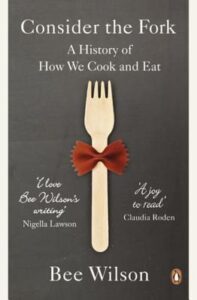 Consider the Fork, Bee Wilson
Consider the Fork, Bee Wilson
Consider the Fork is a look through history at the utensils humans have used for cooking and eating, from knives and forks to the ovens that we prepare food in and our control of fire/heat. Each chapter themes itself around one of these implements, and discusses the changes through history and between cultures.
I found it broadly interesting, but… somehow it didn’t quite keep my attention in the way I expected. I suspect part of it is because I’m not a cook, nor particularly interested in eating food for its own sake. For whatever reason, food and the culture surrounding food is what has caught my magpie interest for the moment, but I don’t have that deep connection to the right pan or the knife that perfectly fits your hand that I think some cooks do and which Wilson seems to have in spades. Also, I think Wilson’s writing style just doesn’t quite work for me, which is fine.
I did finish it, though, and find that in several places I wanted to tell other people the interesting facts I just learned. It’s not bad at all, and I think there are people for whom it would be deeply fascinating. It just didn’t quite click with me.
Rating: 3/5
Tags: Bee Wilson, book reviews, books, history, non-fiction
Posted September 9, 2021 by Nicky in Reviews / 0 Comments
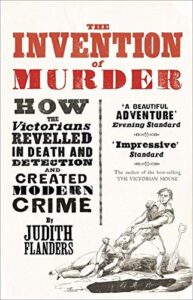 The Invention of Murder, Judith Flanders
The Invention of Murder, Judith Flanders
This could easily have felt really prurient and invasive, given its focus on the various bloody murders that fascinated Victorian society — or too bloodless and dry despite the topic, if it got too academic. I found that Flanders steered a perfect path; it might still be too dry for those who are mostly interested in the murder part of it, but I found it really fascinating, especially as someone who studied the development of crime fiction in novel-form (mostly in the following century).
Flanders does hop about in time a little bit, which gets frustrating and a little confusing. It’s partly because the chapters are grouped thematically, which mostly does work, though since it marks a progression over time then maybe it could have been managed a little better. There are lots of examples to illustrate the trends being discussed, plus images where appropriate as well.
There’s lots of referencing at the end, which is always reassuring in a non-fic work like this. All in all, I’d be happy to read more by Flanders.
Rating: 4/5
Tags: book reviews, books, crime, history, Judith Flanders, non-fiction
Posted September 8, 2021 by Nicky in Reviews / 0 Comments
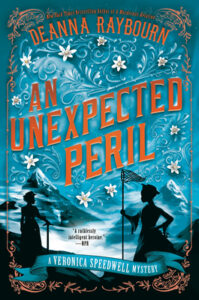 An Unexpected Peril, Deanna Raybourn
An Unexpected Peril, Deanna Raybourn
If this was just any book, I might rate it a little higher, given that I tore through it in three sittings, and would eagerly have done so in one. But because it’s a book in this series, I have to compare it in my mind to the other mysteries, and I don’t think it quite matched up.
The thing that bothered me, really, was that Stoker really doesn’t want to be dragged into the mystery, and yet Veronica insists she knows what’s good for him, dragging him into danger again and again. That’s been the case for a while now, but in this book he genuinely didn’t seem that intrigued or happy to be dragged into a mystery. His worries about Veronica and her need for adventure rang very true, while Veronica just steamed ahead pulling him with her into any mess she could conceivably manage to traipse through.
However, the danger didn’t seem nearly as real in the other books, and the way they stumble out of the final danger just felt so unbelievably convenient and contrived. It took the whole book to get there, and they’re barely in trouble for a chapter before it’s all fixed up — and most of the time they are in trouble, they spend it having a lovers’ tiff.
This all sounds very critical, but I gulped this book down. The pace starts a little slow, but the mysteries are tantalising enough to drag you into it — and there is some genuine pathos and a little character development, mostly toward the end. If you’re a fan of the series, it’s good fun; it’s just not the best.
Rating: 3/5
Tags: book reviews, books, crime, Deanna Raybourn, historical fiction, mystery, romance
Posted September 8, 2021 by Nicky in Reviews / 0 Comments
 The Queer Principles of Kit Webb, Cat Sebastian
The Queer Principles of Kit Webb, Cat Sebastian
I pounced on this as soon as it came out, of course, and wasn’t disappointed. There’s a bit of a vibe of K.J. Charles’ Any Old Diamonds about the plot (except I guess it may also be reminding me of The Gentle Art of Fortune-Hunting, in some ways), and I’m totally here for that, any time. The relationship between the two leads is very different to that book, with far less power-play (and less cold-blooded criminality), but there’s an element of getting your own back that’s delicious.
Speaking of the relationship between the two leads, it’s a sweet one. It takes quite a long time to develop, though the seeds are obvious from the start in their strong physical attraction to one another. The best part, of course, is the slow development of trust between them, despite their disparate backgrounds, despite the harsh parts of their past.
There were a few twists and turns that I spotted coming, but nonetheless made shocked noises when they did happen, because oh! no! how dare! etc. So that was fun, and in general it was just everything I needed — if, in the end, the happy ever after felt rather easy to come by, I completely didn’t mind, because I was charmed by the characters. And in this plague year 2020-gone-2021, we can all do with some happy endings. I don’t want to talk too much about why I felt it was easy to come by, because that’s a spoiler, but suffice it to say that it’s very neat. It feels believable for the characters, but people usually find it harder to make wholesale changes like that!
Rating: 3/5
Tags: book reviews, books, Cat Sebastian, historical fiction, queer fiction, romance
Posted September 7, 2021 by Nicky in Reviews / 0 Comments
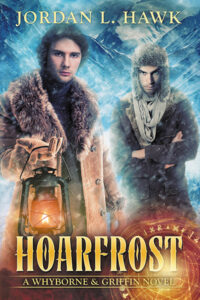 Hoarfrost, Jordan L. Hawk
Hoarfrost, Jordan L. Hawk
Hoarfrost could be a bit of a disappointment, coming after the crescendo that is Whyborne’s confrontation with the Endicotts in the previous book, his discovery of his heritage, and all that came with it. And it does start a little slower, since (once again) they have to journey to actually confront the issue at hand… but in some ways, this is just as climactic for Griffin as the previous book was for Whyborne, giving him a chance to face his fears and reconnect with his family.
I actually ended up reading this in pretty much one sitting (minus the time spent getting out of the bath before I turned into a prune). It has a lot of the features that are great about these books — Christine, archaeology, Whyborne being a secret badass, Griffin and Whyborne learning to darn well communicate — and it combines them into a story that rapidly picks up pace. Almost like an avalanche, you might say.
I fear to say too much, since this book makes things really fall into place for some of our beloved characters. I wonder where it’ll go next — and these days I’m securely along for the ride, given that Whyborne and Griffin generally talk now instead of just making assumptions. (Okay, mostly Whyborne did that.) So yeah, very enjoyable!
Rating: 4/5
Tags: book reviews, books, Jordan Ifueko, Jordan L. Hawk, romance, SF/F
Posted September 7, 2021 by Nicky in Reviews / 2 Comments
 Magic Slays, Ilona Andrews
Magic Slays, Ilona Andrews
Magic Slays is the fifth book of the series, so I really don’t recommend jumping in here. You need to understand the dynamics of the Pack, have caught up on Kate’s ancestry, understand her relationships with Julie and Curran, etc. If you have all that info, then this book is one hell of a ride.
It’s not obvious that it’s going to be that way from the first pages. Kate’s newly created detective agency, Cutting Edge, is in trouble (totally classic for a private investigator) and she’d have trouble paying the bills if it weren’t for the advance she got from the Pack. She does get a call where Ghastek needs a favour, and naturally ends up in deep shit, at which point Andrea shows up.
So far, so good; it’s entertaining, but where are the big guns? Hold on, it’s all building up to something — and once it does, all hell breaks loose. As you’d expect from a book in this series, to be honest.
My favourite part about this book is actually not the epic stuff, though. It’s the moments where Kate and Curran clash and spar, even though they’re together now — and then they talk and work things out and support each other. Kate thinks about running, but doesn’t; Curran thinks about being the autocratic bastard he is to Kate, but doesn’t. They’re still figuring out how to fit together, but they both think it’s worth it.
And then that epilogue. Oof!
Rating: 5/5
Tags: book reviews, books, Ilona Andrews, mystery, romance, SF/F
Posted September 7, 2021 by Nicky in Reviews / 0 Comments
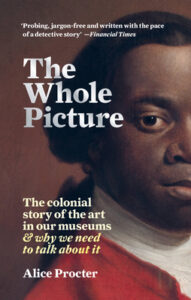 The Whole Picture, Alice Procter
The Whole Picture, Alice Procter
I have very complicated feelings about museums. I love the British Museum’s eclectic wonders, but it’s a museum built on the theft of valuable and spiritual/religious artefacts, the pilfering of dead bodies, and all the other things that people have felt entitled to do and take because colonialism is a hell of a drug. I feel like I at least have a responsibility to think about it, so books like this are a great opportunity to do so.
It’s not a book all about how this and that was stolen, but a book about how we can respond to that. It discusses some of the responses people have created that reflect on colonialism, and the degrees to which they’re successful, as well as discussing some of the older art and objects and how they’re presented to people — sometimes with context, sometimes with misleading context, and sometimes without comment.
It’s a fairly easy book to dip in and out of a chapter at a time, and I found it pretty enjoyable. I did have to keep looking up images and photos to get the full context, because any images were not great on my ereader’s screen. I don’t know how good they are in a printed copy of the book.
Rating: 4/5
Tags: Alice Procter, book reviews, books, history, non-fiction
Posted September 6, 2021 by Nicky in Reviews / 0 Comments
 Burning the Books: A History of Knowledge Under Attack, Richard Ovenden
Burning the Books: A History of Knowledge Under Attack, Richard Ovenden
Burning the Books was really readable, and a bit broader than maybe I expected — it isn’t just about book burnings, but also about the importance of archives, of the kind of information people don’t necessarily expect to be useful. It mentions all kinds of historical events, more and less well-known, which help to give a broader scope of how libraries and archives have impacted people (for good and ill, but often in the end for good — Ovenden mentions the key roles of archives in the reconciliation process for torn nations, like the availability of the Stasi’s archives in East Germany).
It went a bit broader than the similar book I read recently about libraries, but it is mostly focused on books/knowledge as collected and curated by libraries and archives. It’s not super interested in other forms of knowledge, and it doesn’t really touch on modern issues of book bannings (frequent in the US, for instance, enough to spawn Banned Books Week).
Overall, quite enjoyable (insofar as learning about attacks on knowledge is enjoyable; interesting may be the better word), and as far as I can tell, it’s well-researched.
Rating: 4/5
Tags: book reviews, books, history, non-fiction, Richard Ovenden
Posted September 5, 2021 by Nicky in Reviews / 0 Comments
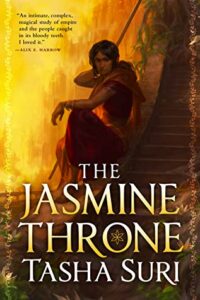 The Jasmine Throne, Tasha Suri
The Jasmine Throne, Tasha Suri
I’ve been meaning to try Tasha Suri’s books for a while, but this seemed like it might be a bit of a daunting introduction. It just looked… chunky, and my attention span is not that great. But I set it up as a book club choice, which means I was bound to at least give it a go — and in the end, though I started late, I ripped right through it. It’s deceptively more-ish, and I found myself reading it in great big chunks. I quickly grew to love Malini and Priya, and the way they’ve each been profoundly messed up (at close quarters and long-distance) by Malini’s brother Chandra.
There are a number of complexities in the book which it dances with well: mixed loyalties and the fear/risk/reward of collaboration with colonial interests, and deciding what will do the least harm and how, how, how to proceed when all the choices look bad. This is best personified by Bhumika, an Ahiranyan woman married to the Parijati regent of her home, pregnant with his child — and fiercely loyal to her Ahiranyan heritage, making bad choices because they’re the only ones she can make. Some of Priya’s confusion about whether to work with Ashok or not, because she loves him as well as fears him and what he will do, comes across extremely well.
Mostly, it all rests on the relationship between Malini and Priya — a bad idea, and one that Priya at least resists on several levels, and yet one which seems almost inevitable from the first time they meet.
There were things I thought were a bit less subtle, like Rao’s name/prophecy and some of Ashok’s behaviour, but overall it came together really well, and I’ll definitely pick up the next books (and Suri’s others).
Rating: 4/5
Tags: book reviews, books, SF/F, Tasha Suri
Posted September 4, 2021 by Nicky in Reviews / 0 Comments
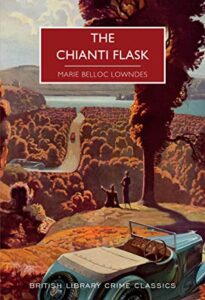 The Chianti Flask, Marie Belloc Lowndes
The Chianti Flask, Marie Belloc Lowndes
I basically sat down and devoured Marie Belloc Lowndes’ The Chianti Flask in two sittings (one before dinner, one after). It’s not very typical of the British Library Crime Classics, being deeply interested in character and motivation, and it felt rather… mournful. The main character’s despondence and depression is rather vivid, and the love affair too. It’s much less about the crime and more the aftermath of it. In some ways, it felt almost like a romance, albeit one scarred through the middle by the mystery which hangs around it.
Given the trial setting at the beginning, and the accusation of a woman of being a poisoner (and dealing with that even after having been acquitted), it has a couple of similarities to Sayers’ Strong Poison in theme, but it is not the usual comfortable, well-worn Golden Age mystery I tend to expect from the British Library Crime Classics. (That’s not a bad thing! I go to them because they’re mostly Golden Age or Golden Age-esque, and I can expect a mildly interesting mystery and the world being set to rights.)
I don’t know how much I liked it, actually: the depression of the main character is really compelling, and then the romance is rather intense (and sometimes wretched). But it almost doesn’t matter if I liked it: I rather admired it — despite not loving the writer’s style at first. I certainly don’t regret spending the time on it, which is an experience I’ve had with some of the other atypical British Library Crime Classics (The Spoilt Kill comes to mind).
Rating: 4/5
Tags: book reviews, books, British Library Crime Classics, crime, Marie Belloc Lowndes, mystery
 Consider the Fork, Bee Wilson
Consider the Fork, Bee Wilson








